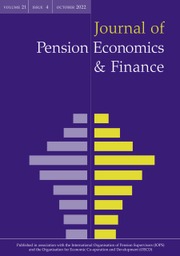Crossref Citations
This article has been cited by the following publications. This list is generated based on data provided by Crossref.
Alho, Juha M.
and
Vanne, Reijo
2006.
On predictive distributions of public net liabilities.
International Journal of Forecasting,
Vol. 22,
Issue. 4,
p.
725.
Lassila, Jukka
and
Valkonen, Tarmo
2007.
The Finnish Pension Reform of 2005.
The Geneva Papers on Risk and Insurance - Issues and Practice,
Vol. 32,
Issue. 1,
p.
75.
Jensen, Svend E. Hougaard
and
Jørgensen, Ole Hagen
2008.
Uncertain Demographics and Fiscal Sustainability.
p.
239.
Fehr, Hans
and
Habermann, Christian
2008.
Uncertain Demographics and Fiscal Sustainability.
p.
117.
Lassila, Jukka
and
Valkonen, Tarmo
2008.
Uncertain Demographics and Fiscal Sustainability.
p.
137.
Lassila, Jukka
and
Valkonen, Tarmo
2008.
Uncertain Demographics and Fiscal Sustainability.
p.
82.
Lassila, Jukka
Valkonen, Tarmo
and
Alho, Juha M.
2014.
Demographic forecasts and fiscal policy rules.
International Journal of Forecasting,
Vol. 30,
Issue. 4,
p.
1098.
KNELL, MARKUS
2018.
Increasing life expectancy and NDC pension systems.
Journal of Pension Economics and Finance,
Vol. 17,
Issue. 2,
p.
170.


